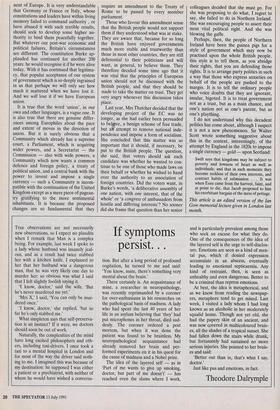If symptoms
persist.. .
True observations are not necessarily new observations, so I expect no plaudits when I remark that Man is a complex being. For example, last week I spoke to a lady whose husband was insanely jeal- ous, and as a result had twice stabbed her with a kitchen knife. I explained to her that her husband was a dangerous man, that he was very likely one day to murder her: so obvious was what I said that I felt slightly foolish saying it.
`I know, doctor,' said the wife. 'But he's never murdered me yet.'
`Mrs X,' I said, 'You can only be mur- dered once.'
`I know, doctor,' she replied, tut so far he's only stabbed me.'
What simpleton says that self-preserva- tion is an instinct? If it were, we doctors should soon be out of work.
Naturally, the complexities of the mind have long excited philosophers and oth- ers, including taxi-drivers. I once took a taxi to a mental hospital in London and for most of the way the driver said noth- ing to me. I imagined this was because of my destination: he supposed I was either a patient or a psychiatrist, with neither of whom he would have wished a conversa- tion. But after a long period of profound cogitation, he turned to me and said: `You know, mate, there's something very mental about the brain.'
There certainly is. An acquaintance of mine, a researcher in neuropathology, was recently reprimanded by a coroner for over-enthusiasm in his researches on the pathological basis of madness. A lady who had spent the last 40 years of her life in an asylum believing that 'they' had put microphones in her throat, died sud- denly. The coroner ordered a post mortem, but when it was done the patient was found to be brainless. My neuropathological acquaintance had already removed her brain and per- formed experiments on it in his quest for the cause of madness and a Nobel prize.
The idea of the layered self — as in `Part of me wants to give up smoking, doctor, but part of me doesn't' — has reached even the slums where I work, and is particularly prevalent among those who seek an excuse for what they do. One of the consequences of the idea of the layered self is the urge to self-disclos- ure. Emotions are seen as a kind of men- tal pus, which if denied expression accumulate in an abscess, eventually leading to emotional septicaemia. Any kind of restraint, then, is seen as unhealthy and even dangerous. Better to be a criminal than repress emotions.
At best, the idea is metaphorical, and as we know from reading the newspap- ers, metaphors tend to get mixed. Last week, I visited a lady whom I had long known as an alcoholic in her moderately squalid home. Though not yet old, she had the papery skin of an ancient, and was now covered in multicoloured bruis- es, all the shades of a tropical sunset. She had fallen down the stairs while drunk, but fortunately had sustained no more serious injuries. She pointed to her bruis- es and said: `Better out than in, that's what I say, doctor.'
Just like pus and emotions, in fact.
Theodore Dalrymple


















































 Previous page
Previous page